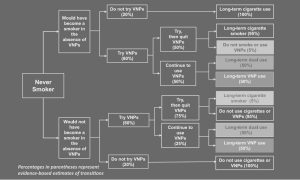 A scientific paper published today proposes that e-cigarettes could cut smoking-related deaths in the U.S. by more than 20%, based on a statistical model of how people smoke and vape.
A scientific paper published today proposes that e-cigarettes could cut smoking-related deaths in the U.S. by more than 20%, based on a statistical model of how people smoke and vape.
Referring to what it calls “vaporized nicotine products” or VNPs, it says that it models the impact of VNP use on public health “in terms of how it alters smoking patterns among those who would have otherwise smoked cigarettes and among those who would not have otherwise smoked cigarettes in the absence of VNPs.
“The model incorporates transitions from trial to established VNP use, transitions to exclusive VNP and dual use, and the effects of cessation at later ages.”
And it concludes that “based on current use patterns and conservative assumptions, we project a reduction of 21% in smoking-attributable deaths and of 20% in life years lost as a result of VNP use by the 1997 US birth cohort compared to a scenario without VNPs.
“Under most plausible scenarios, VNP use generally has a positive public health impact. However, very high VNP use rates could result in net harms.”
Pointedly, and apparently referring to one of the major criticisms that e-cig advocates level against research which purports to find that vaping increases the prevalence of nicotine addiction among youth, it notes that “previous models of VNP use do not incorporate whether youth and young adults initiating VNP would have been likely to have been a smoker in the absence of VNPs.”
By contrast, “this study provides a decision-theoretic model of VNP use in a young cohort that incorporates tendencies toward smoking and shows that, under most plausible scenarios, VNP use yields public health gains.”
Also important in the study, according to its authors, is the use of national rather than regional data, and a distinction between regular vaping and casual trial of e-cigarettes.
“Our model is consistent with recent evidence that, while e-cigarette use has markedly increased, cigarette smoking among youth and young adults has fallen dramatically,” lead author David Levy of Georgetown University in Washington, DC, said in a statement.
The paper, “The application of a decision-theoretic model to estimate the public health impact of vaporized nicotine product initiation in the United States”, is published in the journal Nicotine & Tobacco Research and authored by a U.S./Australian/Canadian team.
What This Means: We will publish a much more detailed examination of this study in the near future. For now, it’s worth noting that it goes to the public-health heart of the policy debate – in a world where smoking exists, are e-cigs good, on balance, or bad? – and also worth observing that it is a theoretical modelling, albeit one based on real data, rather than a recording of absolute fact.
For both these reasons, it is likely to gain considerable attention, critical as well as welcoming.
– ECigIntelligence staff






